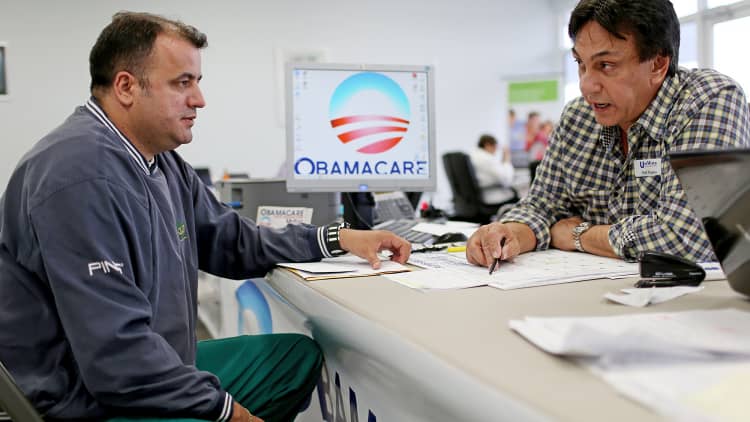
For the first time since President Barack Obama won re-election, his signature health-care law may have slightly more fans than foes, a new poll shows.
The Kaiser Health Tracking poll, released Tuesday, found that 43 percent of the public said they have a favorable opinion of the Affordable Care Act. That compares with 42 percent who said they view the law negatively.
The 1 percentage point gap is within the poll's margin of error and is not statistically significant, the Kaiser Family Foundation said.
Nonetheless, the results follow several months of that gap narrowing, and mark the first time since Obama's November 2012 re-election that the number of people with a favorable view on the law has topped those with an unfavorable view.
Read MoreOscar's Obamacare-fueled growth
"I think what we're seeing is a sort of a return to the normal state" of public opinion about the health law, said Mollyann Brodie, who oversees the poll for Kaiser.
"This narrowing of opinion is occurring at the same time there hasn't been a lot of bad news about the law," she said.
The survey, which questioned 1,506 adults and had a sampling error of plus or minus 3 percentage points, also comes amid signs that the Republican push to repeal the Affordable Care Act has lost steam.
The great divide
While the Kaiser poll showed more people in favor of the law, it again underscored that people's perception of it is strongly linked to partisan affiliation. Democrats overwhelmingly approve of the law, while Republicans oppose it to an even greater degree.
"It's still seen through an incredibly partisan lens," Brodie said.
Republicans questioned for the poll still strongly favor repeal of the law, with 56 percent wanting that to happen.
Read MoreCan this save Obamacare from the Supreme Court?
By comparison, 73 percent of Democrats want the law either expanded or implemented as is. Independents are split exactly down the middle, with 44 percent wanting the law expanded or implemented as is, and the same percentage wanting either repeal or a scaling back of the law.
Given those results, Brodie said, "I think that outright repeal would be very, very difficult."
That difficulty relates in large part to the fact that to 20 million or so people have purchased private health insurance on government-run exchanges or enrolled in Medicaid in the past two years. The exchanges and the expansion of Medicaid benefits to more poor adults are key pillars of Obamacare, and taking away coverage from those who have obtained it via those channels would be politically challenging.
Brodie said it's "unclear" whether the partisan divide over the law "will ever change." That's due in part, she said, to the fact that 56 percent of respondents said the law has had no direct effect on themselves or their families.
"To me, opinion on the law is really just a barometer of how people feel about the president and his administration," Brodie said. "It's the law as a symbol, and it's not clear to me what could change people's views of it, especially when a large share of the American public doesn't recognize or understand the way it might be affecting his or her daily life."
Shifting priorities
A piece that ran in the Los Angeles Times last weekend said "the Republican campaign to repeal the Affordable Care Act is essentially over."
The article noted that GOP leaders in Congress, unable to overcome a presidential veto of an Obamacare repeal bill, are now focused on other legislative issues. The story also pointed out that top Republicans have included "many of the law's key protections into their own proposals," among them guaranteeing coverage for individuals, and subsidizing the cost of that coverage.
A number of Republicans have also said they would offer plans to mitigate the harm from a possible Supreme Court decision in June that could remove, in at least 34 states, the tax credits that help the vast majority of Obamacare customers purchase insurance.
The Times story quoted Republican pollster Whit Ayres, who works for Sen. Marco Rubio, a GOP presidential contender.
"Only 18 percent of Americans want to go back to the system we had before because they do not want to go back to some of the problems we had," Ayres reportedly said. "Smart Republicans in this area get that."
In other findings released Tuesday, the Kaiser poll found that only small percentages of people have seen or used information about the price and quality of health plans, hospitals and doctors.
Read MoreObamacare's surprise for job-based health plans
For example, just 15 percent said they have viewed information about the purported quality of health insurance plans, and just 6 percent actually used such information. And while 13 percent had seen quality information about hospitals, only 4 percent actually used that information to make a decision about where to receive care.
Brodie said the results mirror those found a decade ago when Kaiser asked similar questions about the public's knowledge and use of quality and price information.
"What's ... interesting to me is so little has changed," Brodie said. "It's turns out they're still not seeing it, they're still not using it."


